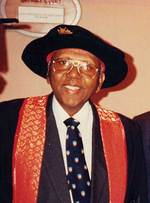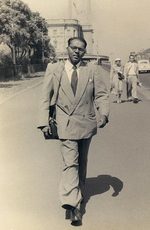Obituary: Datuk Dr Samuel C E Abraham
Paediatrician
Born: 1 March 1929, Taiping, Malaysia
Died: 2 October 2007, Kuala Lumpur, Malaysia  Obituary Obituary
Datuk Dr Sam Abraham was an icon, an idealist, and the "ideal man", not only for his wife Dulcie and the Abraham family, but for all of his loving relatives, friends and colleagues. He was blessed with many talents and he used them to the full and to the best of his ability. At all times he remained a modest and humble man who was full of humour, mischief and great affection for humanity. A University of Adelaide medical graduate, Dr Abraham became one of the most highly respected medical practitioners in Malaysia. Sam came to Australia as a Colombo Plan scholar in the 1950s, first studying Science at the University of Tasmania, and then Medicine at the University of Adelaide. In Adelaide he was a resident at Lincoln College. From his early student days in Australia he was the perfect ambassador for his home country, Malaysia. He was integral in bridging the gap between Australian and Asian students at Lincoln College, and through his good humour he gained a notorious but respected reputation that lives on at the College today. While he was in fourth-year Medicine at Adelaide, Sam earned the distinction of becoming the first overseas Asian student to be elected president of any student representative council in an Australian university. His collegiate spirit and close ties with Australian and Asian students alike set a high standard for those to follow. Part of the medical curriculum in Adelaide at that time included visits to homes of disabled children, such as the Spastic Centre. This made a real impact on Sam. He also travelled across Australia thanks to his membership of the Apex Club, giving him the opportunity to see first-hand the kinds of projects Australians were doing for disabled children. Paediatrics was Sam's main interest because infant mortality in Malaysia was high, and he hoped to make changes for the better. When he returned to his home country in 1959 after graduating from the University of Adelaide, there were only one or two Malaysians trained in paediatrics. Dr Abraham continued his training at the University of Sheffield, where he pursued a specialisation in paediatrics in the early 1960s. To Dr Abraham's credit, he decided early on to remain in government medical service rather than set up a private practice. He did this for two reasons: first, he felt the need to serve the community and wanted to ensure that he gave something back to the people of Malaysia; and second, he knew that in a government practice he would come into contact with a wide variety of cases, the likes of which he would not see in private work. This added to his depth of experience, and further opened his eyes to the state of the nation's health. He subsequently worked in the government medical service for 30 years. Dr Abraham was a committed social activist all his life, and one of the hallmarks of his career and his life was the additional work he conducted in parallel with his paediatric duties. His first posting with the government medical service was at Johor Baru. While at Johor between 1965 and 1975, he established the Johor Baru Spastic Centre, helping to provide proper facilities for the disabled. After being posted to Kuala Lumpur, he set up the Malaysian Paediatric Association to encourage and promote paediatric medicine in his country. His commitment to providing medical services outside of his usual work continued, with many of his Saturdays and Sundays (after church) spent visiting rural communities, most of which had no electricity and no running water. He provided free medical care to those in need, and eventually his visits became so popular that he pioneered what became known as the Sentul Project, with medical students providing free care to poor, rural communities. Even when he set up a private clinic, Dr Abraham remained committed to providing free medical care to the marginalised people of society, including the poor and the disabled. At all times he felt that community service was more important than personal profit, and actively encouraged young medical students to put the needs of society first. In 1991, Dr Abraham helped to establish Dignity and Services, a non-governmental organisation that focuses on the rights of people with disabilities. The quality of life for Malaysian children has dramatically improved over the course of Dr Abraham's career. He became known in Asia, the UK and Australia for his skill and his compassion for children, particularly those who traditionally have not received a high level of care. As one of Malaysia's and indeed Asia's most senior paediatricians he helped to formulate many of Malaysia's sound medical policies on paediatrics. His peers tell of how dedicated, committed and persistent he was in improving the paediatric services in Malaysia. This includes the establishment of the Paediatric Hospital and his campaign for breastfeeding. He was very active in the Malaysian Medical Association (MMA) and the Academy of Medicine. He had many international medical connections in the World Health Organization (WHO) and especially in Australia, the UK in the US - and was consulted as an expert all over the world. He received the Indian President's Award for his vast contribution to paediatrics, especially in Asia. In 1995 he received the Distinguished Alumni Award from the University of Adelaide in recognition of "profound and sustained services to the health of the children of the world". Throughout his life and his career, Dr Abraham was a modest man - grateful for his professional achievements and opportunities - and tireless in his work. He also maintained an all-encompassing warmth and humour, and bestowed great love and affection on all who came in contact with him. He is survived by his wife, Datin Dulcie Abraham, three loving daughters, Karen (a University of Adelaide graduate), Jacintha, and Deborah (a Flinders University graduate), and four grandchildren, Johaan, Thea, Mischa and Aidan.
|






